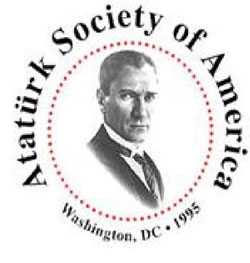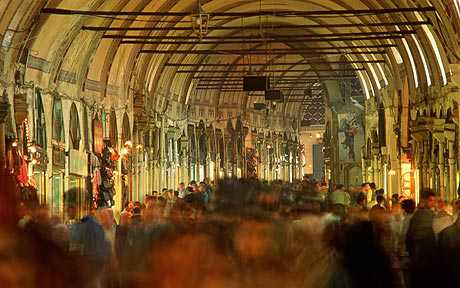
ATATURK SOCIETIES OF USA AND THE UNITED KINGDOM STRONGLY OPPOSE
THE TURKISH RULING PARTY’S DECLARED INTENTION
TO CHANGE “TURKEY’S FOUNDING PRINCIPLES” PROTECTED BY THE CURRENT CONSTITUTION
Turkey’s ruling Justice and Development Party (AKP), led by Prime Minister Recep Tayyip Erdogan, PUBLICLY STATED its intention to change the Turkish Constitution right after the General Elections, scheduled for June 12, 2011. Erdogan is asking voters to enable him to come back to the Turkish Parliament with at least 367 deputies so that he can CHANGE THE TURKISH CONSTITUTION UNILATERALLY.
Erdogan is basing his arguments for a “new constitution” on his party’s desire to have a “more democratic and civil” constitution. This is a disguise of his real intention to change “THE FOUNDING PRINCIPLES OF TURKEY”, explained in the PREAMBLE and enshrined in the FIRST FOUR articles of the CURRENT CONSTITUTION.
The letter and the spirit of the “preamble” and the “irrevocable first four articles” of the current Constitution reflect Ataturk’s philosophy and vision of a “PRO-WESTERN, MODERN, SECULAR, and DEMOCRATIC TURKEY, governed by the RULE OF LAW, EQUALITY AND SOCIAL JUSTICE, its NATIONAL UNITY AND INTERESTS DEFENDED. These founding principles have been protected throughout several amendments of the Constitution since the establishment of the Turkish Republic in 1923.
The AKP wants to Change Ataturk’s Philosophy and Vision
Since coming to power in 2002, the “Islamist AKP” has gradually but increasingly moved away from the Republic’s founding principles and national identity. Numerous foreign observers as well as many Turks are convinced that the AKP is trying to transform Turkey into an Iranian-style Islamic state. Despite its occasional official denials, the AKP’s actions and media statements demonstrate its clear intentions. Most recently, on May 10, 2011, a prominent AKP leader and a State Minister told the Turkish Press openly that “the only irrevocable article in the Turkish Constitution was Article 1, that Turkey was a ‘Republic’. All other articles, he said, could be (and will be !”) changed” once AKP has enough number of deputies in the Parliament. Today, even with less than 367 deputies, the AKP firmly controls the country’s legislative and executive branches and already took control of the judiciary by appointing AKP-sympathetic prosecutors and judges. Security forces are transformed into an oppression machine against opponents and protesters. Academia is silenced by replacing university presidents.
TURKEY’S PRO-WESTERN identity and image have already been tarnished. Initially, the AKP renounced its Islamic heritage and began working to secure European Union(EU)-membership, and turn Turkey into an even more liberal and pro-Western state. However, more than eight years later, the AKP seems anything but pro-Western, liberal and democratic ! It has returned firmly to its Islamist roots. Erdogan has openly played the “Islamist card” in order to boost himself and his political party, and establish greater dominance in the “Islamic world”. Under the AKP rule, liberal political trends have quickly disappeared and EU accession talks have stalled. In foreign policy, relations with the West and Israel have deteriorated. President Gul and Erdogan spent more time visiting Saudi Arabia, Jordan, Qatar, Syria and Egypt, and hosted a series of anti-Western leaders including Sudan’s president Al-Bashir when the Hague International tribunal was accusing Al-Bashir committing atrocities in Darfur. Al-Bashir, who received a warm welcome from Erdogan, was defending the implementation of Sheria Law in resolving the Darfur conflict. Turkey’s foreign policy has shifted decidedly towards the East and promoted solidarity with Islamist, anti-Western regimes.
SECULARISM has been denied and ignored… Erdogan’s famous quote “one can not be a Moslem and secular at the same time” best explains his political philosophy and intentions…Under the AKP rule, religiosity in Turkey has increased markedly. The government began to hire top bureaucrats from an exclusive pool of religious candidates and the percentage of women in executive positions in government, dropped sharply. Religious observance has become a necessity for those seeking government appointments or lucrative state contracts. Bureaucrats in Ankara now feel compelled to attend Friday prayers lest they be by passed for promotions. Turkey today has over 85,000 active mosques, one for every 350 citizens, the highest per capita in the world, compared to one hospital for every 60,000 citizens, with 90,000 imams, more imams than doctors or teachers. It has opened up thousands of madrasa-like Imam-Hatip schools and about four thousand more official, state-run Qur’an courses. Spending by the government’s Directorate of Religious Affairs has grown five fold from 553 trillion Turkish liras in 2002 to 2.7 quadrillion Turkish liras (about US$325 million), during the first four years of the AKP government. The Directorate has a larger budget than 8 other ministries combined. The objective is to train people for every position in the public service in the country. The AKP has also fought very hard, though unsuccessfully, to lift the ban on “head scarves” in schools and government offices.
Erdogan’s desire to change the Constitution unilaterally and his disrespect for secularism may lead to a turnaround in Turkey’s founding principles, and put the country under governance by Islamic Sheria Law.
DEMOCRACY and FREEDOMS have been severely restricted. The mysterious Ergenekon case has become the largest and most controversial judicial investigation in recent Turkish history. Hundreds of people, mostly opponents of AKP and Erdogan, including the high-ranking Army officers, famous journalists, writers, artists, university professors, and heads of modern, secular civil societies have been detained, mostly in multiple simultaneous dawn raids by members of the Counterterrorism Department of the Turkish National Police (TNP). They are tried under detention that has been going on for more than three years without any sign of conclusion. None of the detainees has been convicted, yet.
At the same time, severe restrictions have been put on “freedom of speech” and “freedom of press”. On April 2010, Turkey’s Justice Minister said that police intelligence listens to the private conversations of 70,000 people; almost one in every 1,000 Turks live in police scrutiny today. Turkey also ranks at the bottom of the list in Western Europe with regard to the “freedom of press”. The President of Turkish Journalists Union (TGS) complained that there are thousands of cases filed against journalists, more than hundred filed by Erdogan alone. Currently about 100 Turkish journalists are in jail. One of them was arrested even before the book was published, for authoring a book that investigates the grip on Turkish politics of a religious group. The police seized and burned the unpublished book, while imposing a ban on its internet accessibility. Working closely with the PM’s office, the Turkish Telecom and Communication Ministry (TIB) put thousands of wire tabs on political rivals and introduced censorship on “Google” and “YouTube” many times. TIB recently announced its intention to impose, more restrictions on internet. The great majority of the independent media, critical of the government, were forced through unclear legal reasons to sell their businesses, daily newspapers and TV stations to AKP supporters. As a result, the share of Turkish media held by religious, pro-AKP groups rose from about 20 to over 65 percent, at present. In these sale transactions, large credits were granted to AKP supporters from state-owned banks. Furthermore, the Public Procurement Law was amended several times and thresholds for tenders reduced steadily to avoid competitive bidding and allow sales to AKP supporters.
We oppose to any change in Turkey’s “Founding Principles and Vision”
We, the members of the Ataturk Societies of USA and the United Kingdom, STRONGLY OPPOSE AKP’s plan to change the constitution and remove the “founding principles of Turkey” from its text. Even with these principles in place in current Constitution, the AKP has moved ahead with its Islamist agenda and already tarnished Turkey’s pro-Western, modern, secular and democratic identity and image. With the removal of Ataturk’s philosophy and vision from the Constitution, it would be harder, if not impossible, to prevent Turkey’s slide into an anti-Western, anti-Democratic, and anti-Secular Islamist state.*
References:
1. Turkish Constitutional Court Documents. (Ankara ) May 27, 2011;
2. “Degismez Maddeler Degisebilir !” Bulent Arinc, Radikal (Istanbul) May 10, 2011
3. “The Islamists Show Their Hand” and “Abandoning Ataturk”, Soner Cagaptay,
Newsweek, Feb.14, 2009 and Newsweek, Sept. 19, 2009
4. “Sayilarla Kendine Gelmek…” Can Dundar, Milliyet (Istanbul), June 22, 2007
5. “Turkey’s Turning Point”, Michael Rubin, Apr. 14, 2008
6. “Ergenekon – Between Fact or Fantasy”, Gareth H. Jenkins, Silk Road Papers, Aug.2009
7. “Corruption in Public Procurement – Turkey “Global Integrity Report, 2008





